#napoleon I
Text
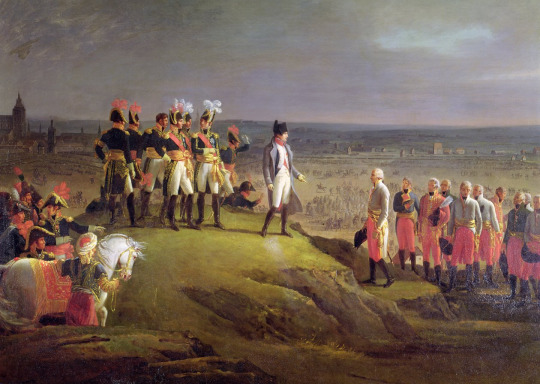
Napoleon accepts the surrender of an Austrian army under General Mack on 20 October 1805 (detail)
by René Théodore Berthon
#napoleonic wars#napoleon#napoléon#bonaparte#napoleon bonaparte#napoléon bonaparte#art#rené théodore berthon#ulm campaign#ulm#germany#emperor#empire#france#french#austria#austrian#habsburg monarchy#holy roman empire#history#europe#european#napoleon i#napoleonic#karl mack von leiberich#soldiers#roustam raza#landscape#marengo#horse
61 notes
·
View notes
Text
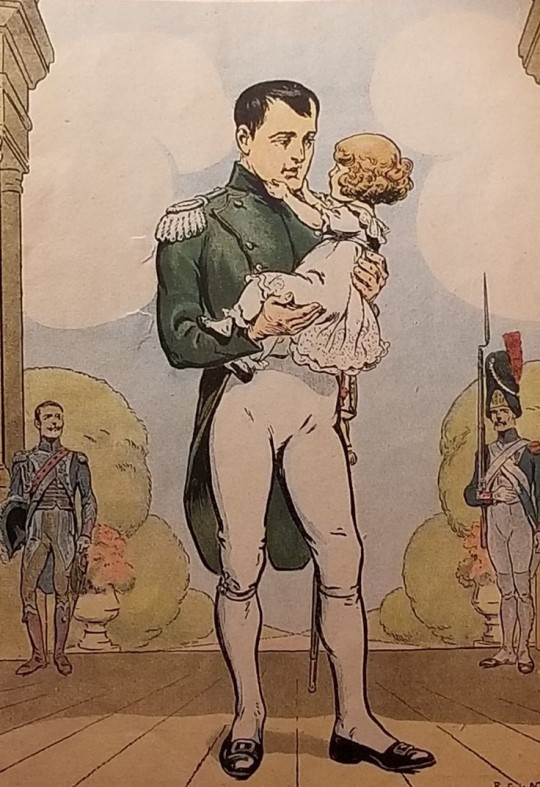


AAAAAAWWUUUWWW
#napoléon bonaparte#napoleon bonaparte#napoleon i#napoleon ii#napoleonic era#napoleonic shitpost#THEY ARE SOOOO SWEEEEET AAFHDHAILFKQAAAAAAAA
93 notes
·
View notes
Text
74 notes
·
View notes
Text
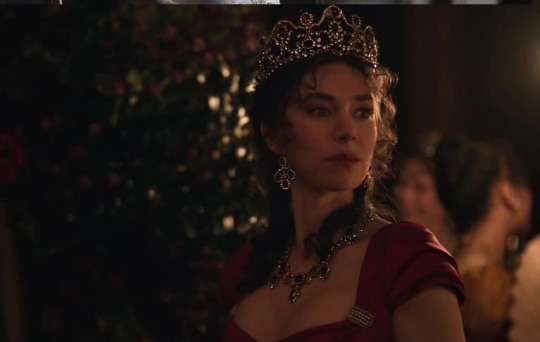
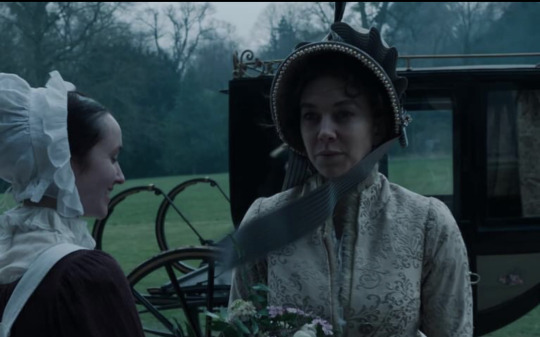
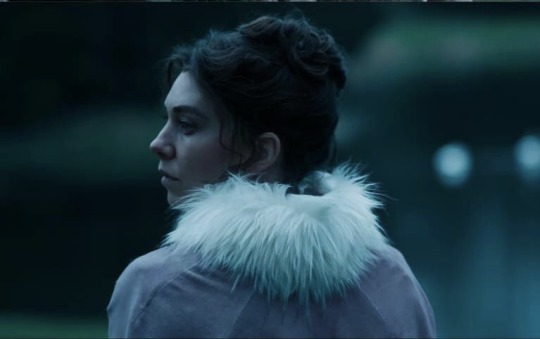
This Josephine looks to be a moody one.
#napoleon#Napoleon Bonaparte#Napoleon I#emperor napoleon#Napoleon the movie#Napoleon movie#movie promo#film stills#ridley scott Napoleon#ridley scott#josephine#rose de Beauharnais#josephine de beauharnais#josephine bonaparte#empress Josephine#movie josephine#Vanessa Kirby#Vanessa Kirby napoleon#Vanessa Kirby josephine
104 notes
·
View notes
Text

Red and Gold Felt Cloak, 1797-1805, French.
Worn by Napoleon Bonaparte.
Royal Collection Trust.
#1797#1790s#1790s France#napoleon#Napoleon I#napoleon bonaparte#cloak#red#felt#gold#royal collection trust#french#1790s extant garment
57 notes
·
View notes
Text
I've done this new video edit on Napoleon (2002 series with Christian Clavier) using the song "Hurt" by Johnny Cash, that I think is very fitting for him!
#napoleon#napoleonic era#napoleon bonaparte#history#1800s#josephine de beauharnais#napoleon 2002#napoleon series#christian clavier#napoleon movie#french empire#napoleonic empire#napoleon I#bonaparte#napoleon edit#video edit
27 notes
·
View notes
Text
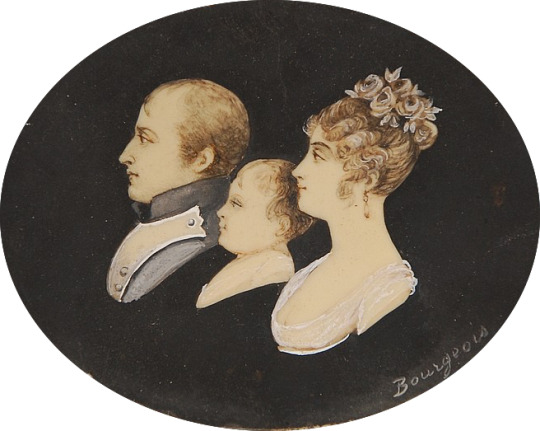
Miniature of Napoleon, Marie Louise of Austria, and their son Napoleon II.
30 notes
·
View notes
Text

Empress Marie Louise's Chaumet Micro-Mosaic Parure, A Wedding Gift From Napoleon I
Photo: The Museum Of Decorative Arts, Prague
Source: thejewelleryeditor.com
#empress marie louise#napoleon i#napoleon#chaumet#micro mosaic jewelry#parure#antique high jewelry#high jewelry#luxury jewelry#fine jewelry#fine jewellery pieces#gemville
229 notes
·
View notes
Text
"To rule in France one must either be born in grandeur... or else be capable of distinguishing oneself above all others."
- Napoleon Bonaparte, to his brother Joseph
#napoleon i#napoleon#napoleon bonaparte#first french empire#french history#joseph bonaparte#sunglassesnovel#bonaparte family
48 notes
·
View notes
Text

always sad to find out your historical fav would be anti-vax in modern times
#there are funny jokes to be made about this but i'm not funny enough to think of any#napoleon bonaparte#napoleon i#napoleonposting#certifiedhistoryaddict#alt to be added
24 notes
·
View notes
Text
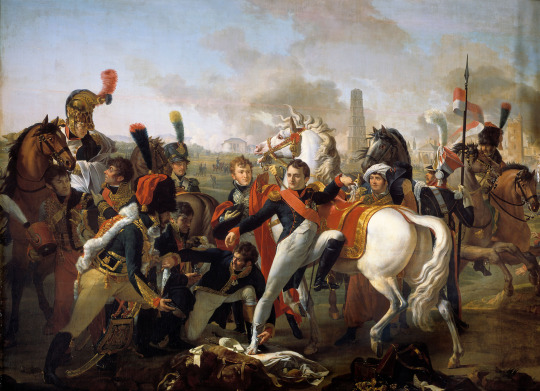
Napoleon dismounting with an injured foot at Regensburg, aided by the Surgeon, Yvan, 23 April, 1809
by Claude Gautherot
#napoléon#napoleon#bonaparte#napoleon bonaparte#napoléon bonaparte#art#battle of ratisbon#battle of regensburg#napoleonic wars#roustam raza#claude gautherot#pierre gautherot#pierre claude gautherot#dezydery chłapowski#alexandre urbain yvan#france#germany#history#french empire#austrian empire#holy roman empire#europe#european#french#regensburg#napoleonic#napoleon i#emperor#empire#bavaria
60 notes
·
View notes
Text
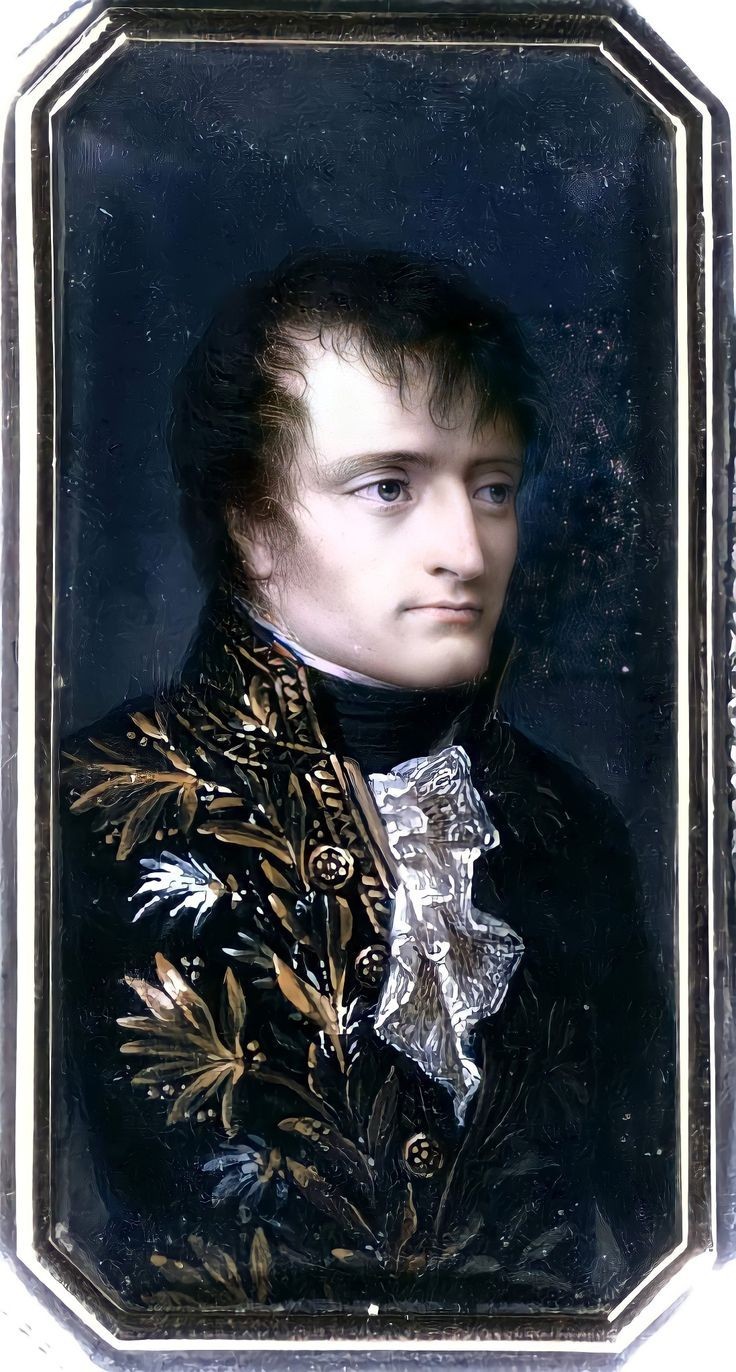
A wonderful portrait. I'm in love with the details of the coat
41 notes
·
View notes
Text
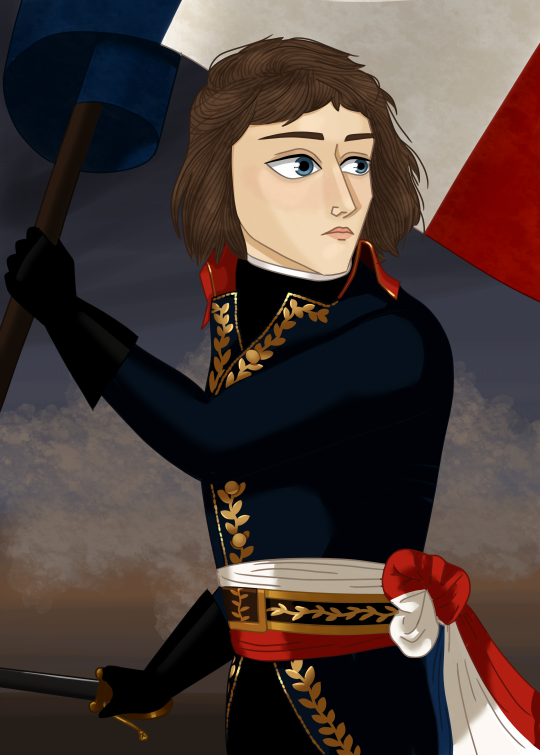
Drawing based on the painting 'Napoleon au pont d'Arcole' by Jean-Antoine Gros, my personal favourite Napoleon painting (partially because he had to sit on Josephine's lap for the painting to be completed)
yes I completely gave up on trying to accurately copy the flag in the original painting. I was tired and could not be bothered.
(also now I totally understand Jacques-Louis David's obsession with drawing Napoleon's face because Naps does have a very nice face to draw)
#my art#art#artists on tumblr#napoleon#Napoleon I#napoleonic era#napoleonic#history#French history#art history
36 notes
·
View notes
Text

#jacques louis david#my post#uniform#army#general#napoleon crossing the alps#napoleon#napoleon i#napoleon bonaparte
8 notes
·
View notes
Note
What the tea on Maria Carolina? You said in one of your posts: “Maria Carolina truthers know she's the most interesting daughter and the one there should be hundreds of books and movies about, but the general audiences haven't seen the light yet.” I’m intrigued
Hi! Sorry it took me so long; I was reading a book about the Bourbons in Naples and I wanted to finish it to be able to give a more complete answer… but it ended up taking me MONTHS to be done with it.
This answer was a bit difficult to put together because Maria Carolina’s life was very eventful, so I’ll just mention some facts about her life, focusing more on the Napoleonic era and Napoleon specifically because I think you’ll be more interested in that. Also please feel free to correct me If I got something wrong, since this is a time period I’ve only started to learn about recently. So what was the tea?
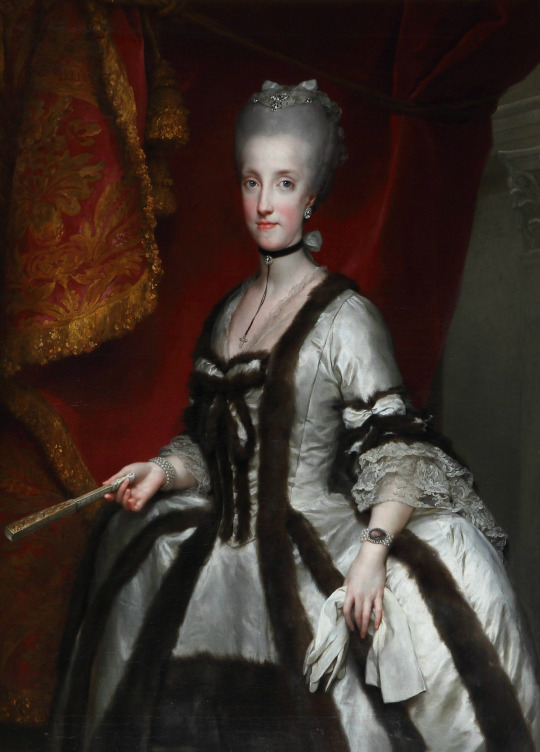
Born in 1752 Maria Carolina was the thirteenth child of Empress Maria Theresia and Franz I, Holy Roman Emperor. As part of her mother’s policies of rapprochement to the Bourbons, she and her siblings were engaged to different members of the houses of Spain, France, Parma and Naples. Maria Carolina was promised to the Dauphin of France, but when her elder sister, promised to the King of Naples, died of smallpox, she took her place.
Ferdinando of Naples had been a child king, and he remained so for the rest of his life. His only diversions were hunting and pulling pranks on his courtiers, and he had a terrible reputation across the courts of Europe as an uneducated, bad mannered, spoiled man, kept in ignorance by his Ministers so they could control him. Everyone pitied the young Archduchess’ fate, her mother Maria Theresia wrote around the time of Maria Carolina’s wedding that she “trembled in fear for her”. But duty came first, and so she went to Naples, aged only sixteen.
Maria Carolina did not had it easy at first. She was terribly homesick and found herself in a court that could not have been more different to the one she grew up in. When her sister Maria Antonia married the Dauphin of France, she wrote to her former aya:
When I imagine that her fate will perhaps be the same as mine, I want to write volumes to her on the subject, and I very much hope that she has someone like me [to advise her] at the beginning. If not, to be frank, she may succumb to despair. One suffers real martyrdom, which is all the greater because one must pretend outwardly to be happy. I know what it is like, and I pity those who have yet to face it… I would rather die than endure again what I went through at the beginning. Now all is well, which is why I can say—and this is no exaggeration—that if my faith had not told me, ‘Set your mind on God,’ I would have killed myself.
Unsurprisingly Maria Carolina didn’t fall head over heels for her husband, but she did convince him that she had, and eventually won his affection. After she bore a son in 1775 she earned a seat in the State Council (as her marriage contract established), and from that point onward she became an active player in Neapolitan politics. One of her firsts moves was to remove the Secretary of State, Marchese Tanucci, who had been Regent during her husband’s minority and still held a huge influence over him.
After Tanucci’s dismissal she became the person with the most influence over Ferdinando, and she pretty much had him wrapped around her finger for most of their marriage, acting as the de facto ruler of Naples. Every decision the king took was only after consulting his wife, and she often had the final say. However, this didn’t meant Maria Carolina held absolute power: Ferdinando was still a very unpredictable person, and as soon as his wife was out of his favor he stopped listening to her.
Maria Carolina was enthusiastic about the ideas of the Enlightenment, as many other royals were at first, and even protected and encouraged the Masons in Naples during her early years as queen. But she was still the consort of an absolute monarch that believed they were chosen by God to rule, so it shouldn’t come as a surprise that she was horrified by the French Revolution and fervently opposed it. If it were for her, she would've declared war on France immediately, but this was not possible. On the execution of her brother-in-law Louis XVI she wrote:
Knowing your upright mind, I can imagine your emotion on hearing of the appalling crime perpetrated against the unfortunate King of France in all solemnity, tranquillity and illegality (…) He was the head of our family, our kinsman, cousin and brother-in-law. What an atrocious example! What an execrable nation! I know nothing about the other wretched victims in the Temple. If sorrow does not kill them, other horrors may be expected from this horde of assassins. I hope that the ashes of this good Prince, of this too good Prince who has suffered shame and infamy for four years culminating in execution, will implore a striking and visible vengeance from divine Justice, and that on this account the Powers of Europe will have no more than a single united will, since it is a matter in which they are all involved.
She was growing increasingly anxious about her sister, Queen Marie Antoinette, and her hatred for France became an obsession:
I hear horrible details from that infernal Paris. At every moment, at every noise and cry, every time they enter her room, my unfortunate sister kneels, prays and prepares for death. The inhuman brutes that surround her amuse themselves in this manner: day and night they bellow on purpose to terrorize her and make her fear death a thousand times. Death is what one may wish for the poor soul, and it is what I pray God to send her that she may cease to suffer. . . . I should like this infamous nation to be cut to pieces, annihilated, dishonoured, reduced to nothing for at least fifty years. I hope that divine chastisement will fall visibly on France, destroyed by the glorious arms of Austria.
At this point she had lost all hopes of her being rescued, and wished her “a natural death as the best thing that could happen to her”. But even though she had been waiting for it, the news of Marie Antoinette’s execution still shocked her. She wept and prayed with her children for “her wretched sister”.
Naples fell into a social crisis during these years, paranoia, fear and suspicion of the revolution in every corner. There was an active persecution of everyone thought to be a “jacobin”, arrests, trials and executions. But the country couldn’t wage war against France, and eventually they had to sign a peace treaty, which the Queen disapproved: “I am not and never shall be on good terms with the French… I shall always regard them as the murderers of my sister and the royal family”.
It was also during this time that the star of a certain Bonaparte started to rise, and Maria Carolina followed his career with interest and admiration. Before the treaty of Campo Fornio in October 17, 1797, she wrote about Napoleon:
I admire him, and my sole regret is that he serves so detestable cause. I should like the fall of the Republic, but the preservation of Bonaparte. For he is really a great man; and when one can only see ministries and sovereigns with petty and narrow views, one is all the more pleased and astonished to watch such a man rise and increase in power, while deploring that his grandeur is attached to so infernal a cause. This may seem strange to you. But while I loathe his operations, I admire the man. I hope that his plans will miscarry and his enterprises fail; at the same time I wish for his personal happiness and glory so long as it is not at our expense… If he dies they should reduce him to powder and give a dose of it to each ruling sovereign, and two to each of their ministers, then things would go better.
Soon she would have less nicer things to say about Naps, but she never lost that original admiration and astonishment.
In 1798 Ferdinando, encouraged by his wife and the British, led a expedition in December to try to expel the French from Rome. Not only the Neapolitan troops weren’t prepared to defeat the French Army, they were also technically still at peace with France, so this wasn’t a good move at all, and only two days after entering Rome Ferdinando had to retreat. Expectedly, Napoleon’s reaction to such a break of peace was marching over Naples. The royal family had to flee to Sicily, a tragic journey in which Maria Carolina’s six-years-old son Alberto died after a series of convulsions.
This ask is already too long to unpack all the political mess around the short-lived Parthenopean Republic, so to summ it up: it didn’t work out, and by 1799 the Bourbons were back in power. They were unforgiving of the republicans: during the following months there were thousands of arrest and hundreds of executions and deportations. Maria Carolina felt no mercy for them: “Death for the ringleaders, deportation for the rest... Our country must be purged of this infection”.
The Queen returned to Naples in August 1802, after more than three years of absence. She had never been a liked queen, but her unpopularity reached a new low since she was blamed for all the misfortunes of the last years. Having lost the influence she had on her husband, who held her responsible for the Rome expedition fiasco, she meddled a little less in politics now, dedicating mainly to her children and grandchildren, particularly to her unmarried daughters.
Speaking of her children, she had seventeen (!!!) but she would outlive fourteen of them. Part of her masterplan for them was to marry them all to her Habsburg nephews and nieces, and in many cases she succeeded. Just to name one exemple her eldest daughter Maria Theresa married Emperor Franz II/I of Austria. Maria Carolina’s relationship with this son-in-law ended up being a bit tense, since Franz found her mostly meddlesome and never aligned with her plans. On top of that, she was quite hurt when Franz remarried only months after her daughter’s death; after he announced his engagement she stopped adressing him as her son and resorted only to “Your Majesty” instead.
In 1804 Napoleon became Emperor, and we have a letter she wrote to Minister Gallo on this. Buckle up because whatever you imagine her reaction was, you aren’t ready for it:
It was not worth the trouble to condemn and slaughter the best of kings [Louis XVI], dishonour and revile a woman, a daughter of Maria Theresa, a holy princess [Marie Antoinette], to wallow in massacres, shootings, drownings, and kill six hundred prelates in a church, perpetrating horrors of the most barbarous ages at home and abroad, writing whole libraries on liberty, happiness, etc., and at the end of fourteen years become the abject slaves of a little Corsican whom an incredible fortune enabled to exploit all means to succeed, marrying without honour or decency the cast-off strumpet of whom the murderer Barras was surfeited, Turkish or Mohammedan in Egypt, atheist at the start, dragging the Pope after him and letting him die in prison, a devout Catholic after that, practising every deceit, shortening the lives and normal careers of sovereigns who might assert themselves, only allowing the dummies to vegetate, then atrociously, without a shadow of justice, assassinating the Duc d'Enghien, plotting himself (and he did not blush to admit it, so blinded is he by passion) a conspiracy to victimize the rulers he still feared, and on top of all these abominations he is acclaimed as Emperor: he and his race of Corsican bastards are to dominate almost half Europe, yet every thinking person is not revolted. Far from it, their egoism and weakness are such that they study how low they can prostrate themselves before the new idol… Send me word of the august Emperor’s intentions regarding Italy: whether he will deign to accept us as his slaves or will leave us in our obscurity… Tell me what the other Powers are saying. I imagine a Gloria in Excelsis Demonio will be the general refrain…
She took it pretty well right?
The future of the Bourbons of Naples once again seemed bleak, and this time Maria Carolina resorted to directly appealing to Napoleon. This was the beginning of a very passive-agressive epistolary relationship, both of them trying to be civil but still borderline insulting each other. I honestly find this funny, because you have Maria Carolina swearing to Napoleon that she had nothing against him or France and then she would write this to one of her ministers: “You will never imagine the rage and despair which the extremely insolent screed of the scoundrelly but too lucky Corsican has caused me.”
Despite the passive-agressiveness, when Napoleon was looking for a princess bride for his stepson Eugène he actually considered one of Maria Carolina’s daughters, Maria Amelia, as a possible candidate. But when the Minister of Foreign Affairs Gallo told Maria Carolina of Napoleon’s inquiries about her daughter she was so utterly horrified at the idea of marrying into the Corsican’s family that the project was immediately dropped (eventually Maria Amelia would go on to marry the Duke of Orléans, later King Louis Philippe I, and became the last queen of the French).
After Austerlitz Napoleon pretty much had all of Europe eating from his hand, and the Neapolitan sovereigns felt abandoned by every other power. Maria Carolina tried one last futil attempt to plead to Napoleon, but he had already decided to take Naples. The King was the first to Sicily flee this time, the Queen stayed behind and tried to organize a resistance, but eventually she realized there was nothing they could and also fled with her daughters. Before sailing she wrote to her daughter Empress Maria Theresa of Austria: “I fear we shall never see Naples again”. She was right.
The royal couple spent their second exile the same way they spent their first: Ferdinando living his best life enjoying the freedom he had in Sicily and Maria Carolina being utterly miserable. Her health worsened and she often was in pain, but recovering Naples from the Bonapartes became her obsession. She was the leading force behind every attempt to get the kingdom back, but soon she started to crash with their only allies left, the British. They wanted to keep the Bourbons in Sicily, getting back Naples was not a priority for them.
So remember Maria Carolina’s her reaction when Napoleon suggested to marry her daughter to Eugène? Well she didn’t took her granddaughter’s marriage to Napoleon himself any better: “Only this calamity was held in reserve. To become the Devil’s grandmother”.
But at the end, the final boss in Maria Carolina’s life wasn’t Napoleon, but the British. The Queen was too meddlesome and hindered their plans, and made a personal enemy of the British representative Lord Bentinck. Maria Carolina was accused of conspiring and being a threat to Sicily, and eventually the King was forced by the British to send her away. Exiled in exile, having nowhere else to go, she returned to Vienna in an eight-months-journey. While her son-in-law had no desire to receive her, he couldn’t turned her away either. She got in a better mood once she was once back at her childhood home, spending time with her Austrian grandchildren. It was there that she heard of the French defeats and Napoleon’s abdication.
Even though Maria Carolina made her hatred of Napoleon her personality for fifteen years she felt sympathetic towards him after he was defeated, reproached Marie Louise for not going to Elba with her husband, and told her that if she wasn’t allowed to reunite with him she should tie her bed-sheets to her window and escape, because marriage was for life. She also showed a lot of interest in her great-grandson, little Napoleon II, whom she called “mon petit monsieur”; in a letter to Marie Louise she described him as “very charming, quiet and well behaved” and told her that “may God give you in him every consolation a mother can receive.”
Maria Carolina was not to see the Bourbons restored in Naples. She died of a stroke in September 8, 1814, aged sixty-two-years old. At the time of her death Murat was still King of Naples, and the allies were happy to leave Ferdinando in Sicily. She was buried in the Capuchin Crypt, her death being only a small incident in the Congress of Vienna’s dance.
Overall, I personally find Maria Carolina the most fascinating because of everything she represented: she was a healthy daughter of the ancien régime that saw how the world as she knew it crumbled down and changed forever, to the point that by the time of her death she, the last surviving child of Maria Theresia, was a living relique (and she wasn’t even that old - a testament of how fast everything had changed). And she didn't got there sitting by idly: she fought against this new world every step of the way, made it out alive, but lost the battle still. And I don't know about you, but to me this is just a more interesting story to tell than Unoriginal Marie Antoinette Adaptation Number 7383.
Sources:
Acton, Harold (1998). The Bourbons of Naples (1734-1825)
Castelot, André (1974). King of Rome; a biography of Napoleon's tragic son
Stollberg-Rilinger, Barbara (2020). Maria Theresa: The Habsburg Empress in her Time
#sorry if this answer is too long and messy - i been putting it together little by little for the past month#but this is only the top of the iceberg i left out so many things#queen maria carolina of naples#ferdinando i of the two sicilies#house of habsburg#house of bourbon-two sicilies#napoleon i#cw suicide mention#asks
52 notes
·
View notes
Text
Grandpa’s gift
There is an incredibly fascinating artistic detail that haunts me after a person on the Internet made their observations and I’m really excited to share them with you!
So, we have this illustration from a book “Life of Napoleon Bonaparte” by William Milligan Sloane (1896). Here we can see Napoleon visiting his son in a timeframe close to spring of 1813, when it became obvious that his larger allies are good for nothing and probably going to leave him soon. Napoleon is shown deep in his thoughts holding a hand of his beloved son and looking at something far beyond our reach…
Or is he?
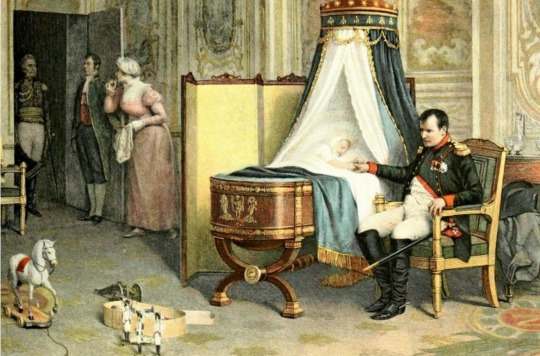
Speculations can be made that he actually has his attention on toy soldiers present in a foreground of the picture.
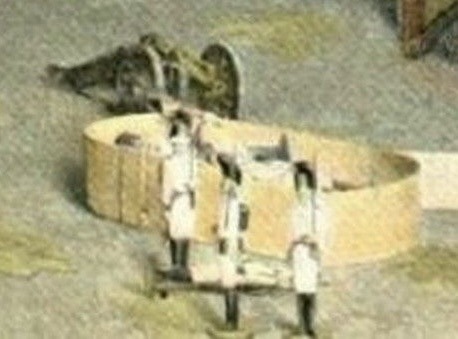
While a cannon is more than rightfully Napoleon’s own symbol in a way, these toy soldiers do not represent any kind of French troops. Yes, it’s possible to discern their tall hats but those are not bear hats of the Old guard, for sure.
They probably are the hats of Imperial (Austrian) grenadiers from the period of Revolutionary wars. You can even see parts of red lining and red cuffs on their snowy-white coats.

And even if it was somewhat of a tradition to gift toy soldiers representing military units of relatively old times, an air of symbolism also surrounds such a choice. You know, symbolism straight from those times when Imperial forces hadn’t yet suffered critical blows from the renewed French army and thought of themselves as fighters for truth and Habsburg’s justice.
So yeah. What a meaningful gift from a caring grandfather to his grandson. 🤭
(I also imagine how prince Schwarzenberg could have delivered this exact gift personally to Marie Louise, when he came to Paris as a diplomat once more and it literally gives me goose bumps. I love such small but significant plots with all my heart. ❤️)
#napoleonic aesthetic#napoleon i#napoleon ii#napoleon bonaparte#l’aiglion#franz ii of austria#napoleonic era#napoleonic wars#premier empire#austrian empire#19th century
48 notes
·
View notes